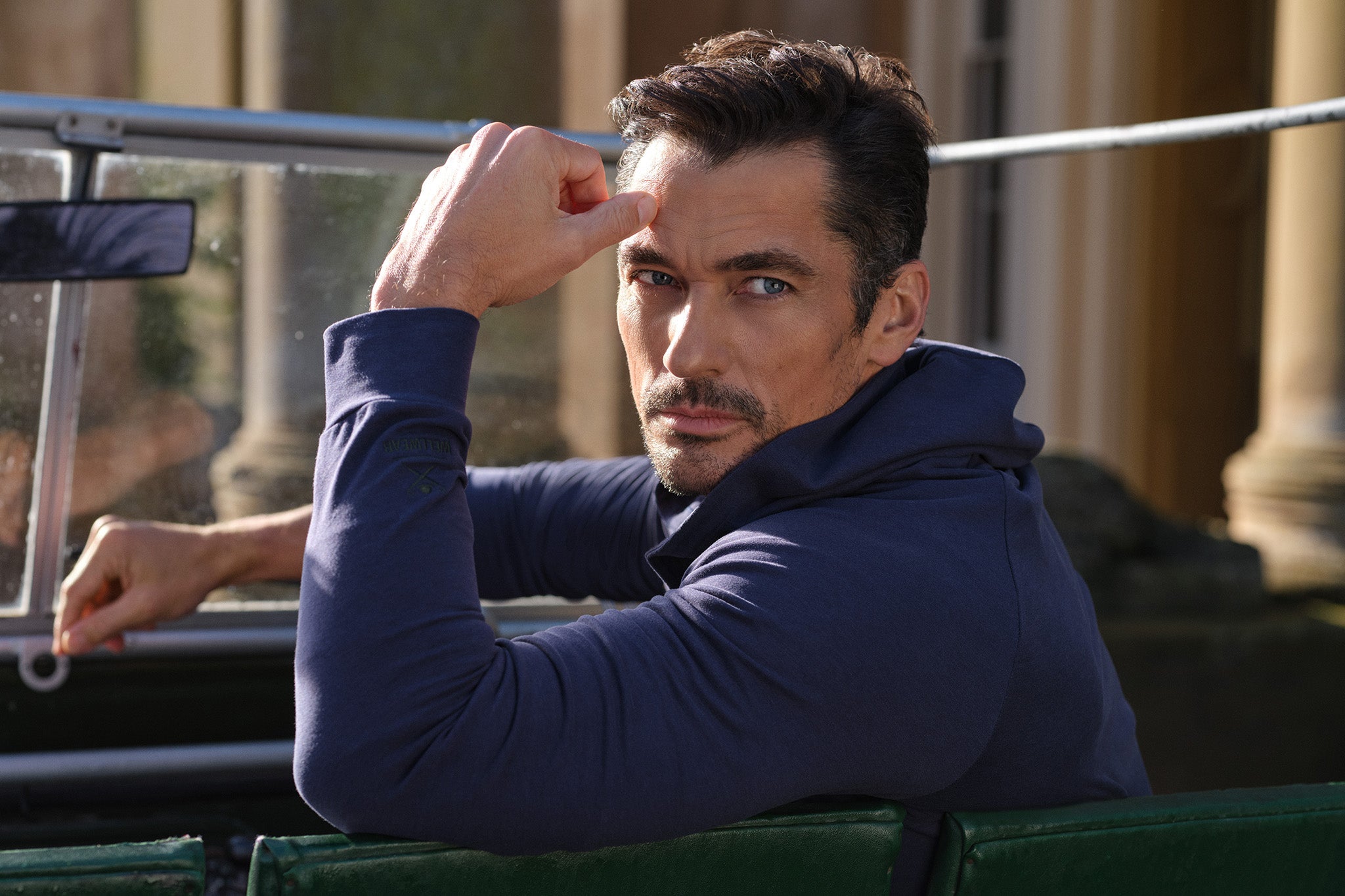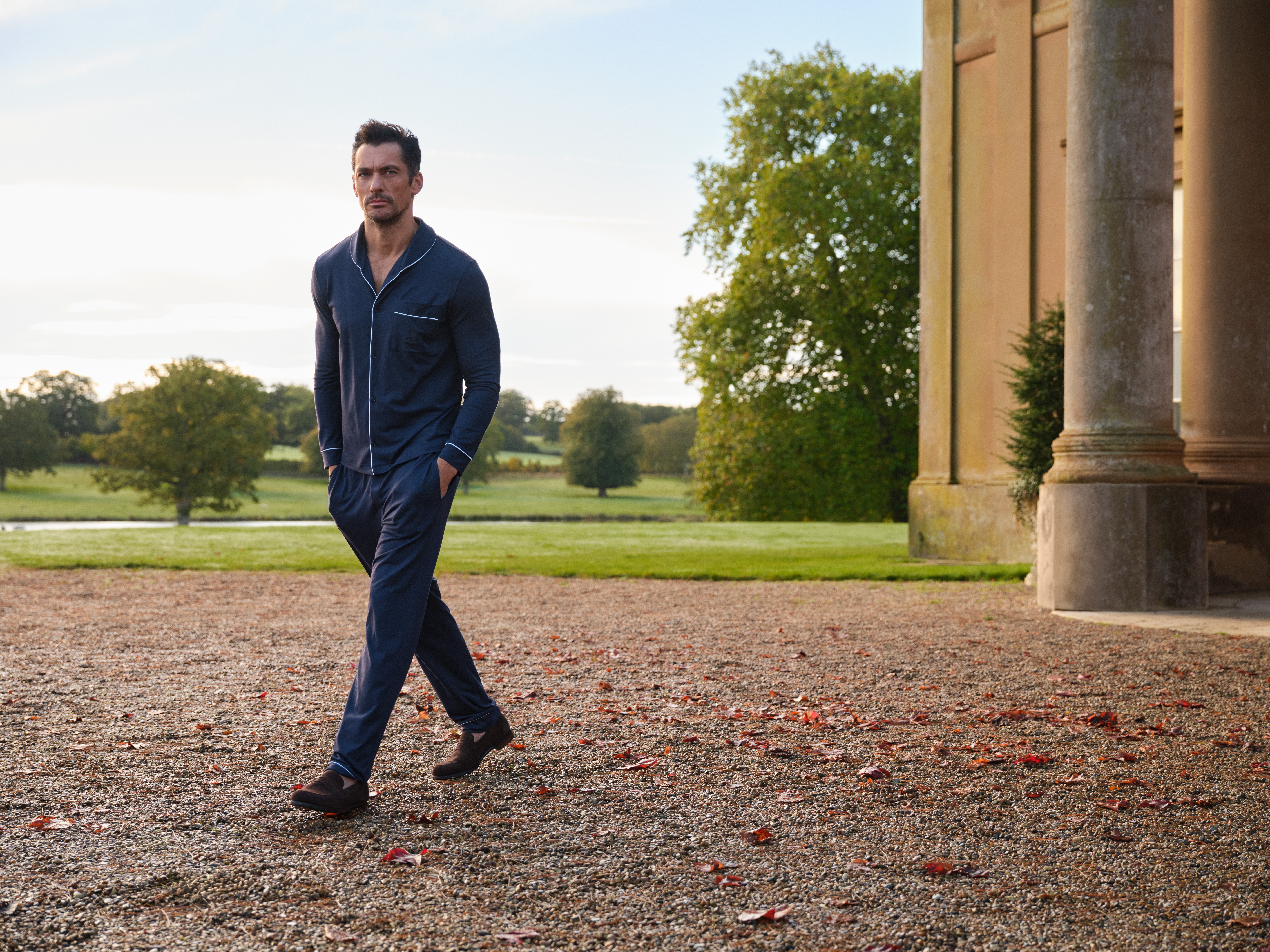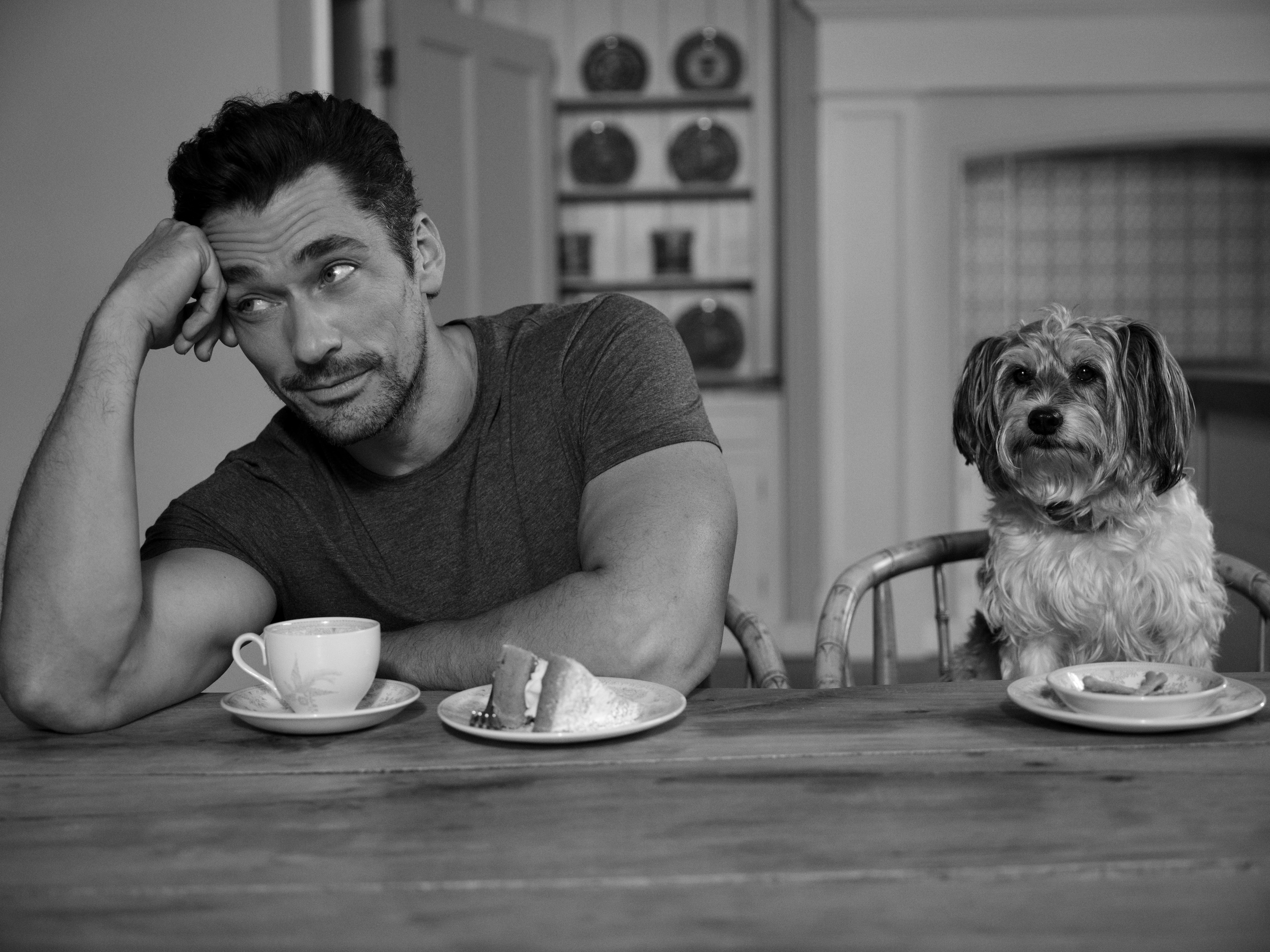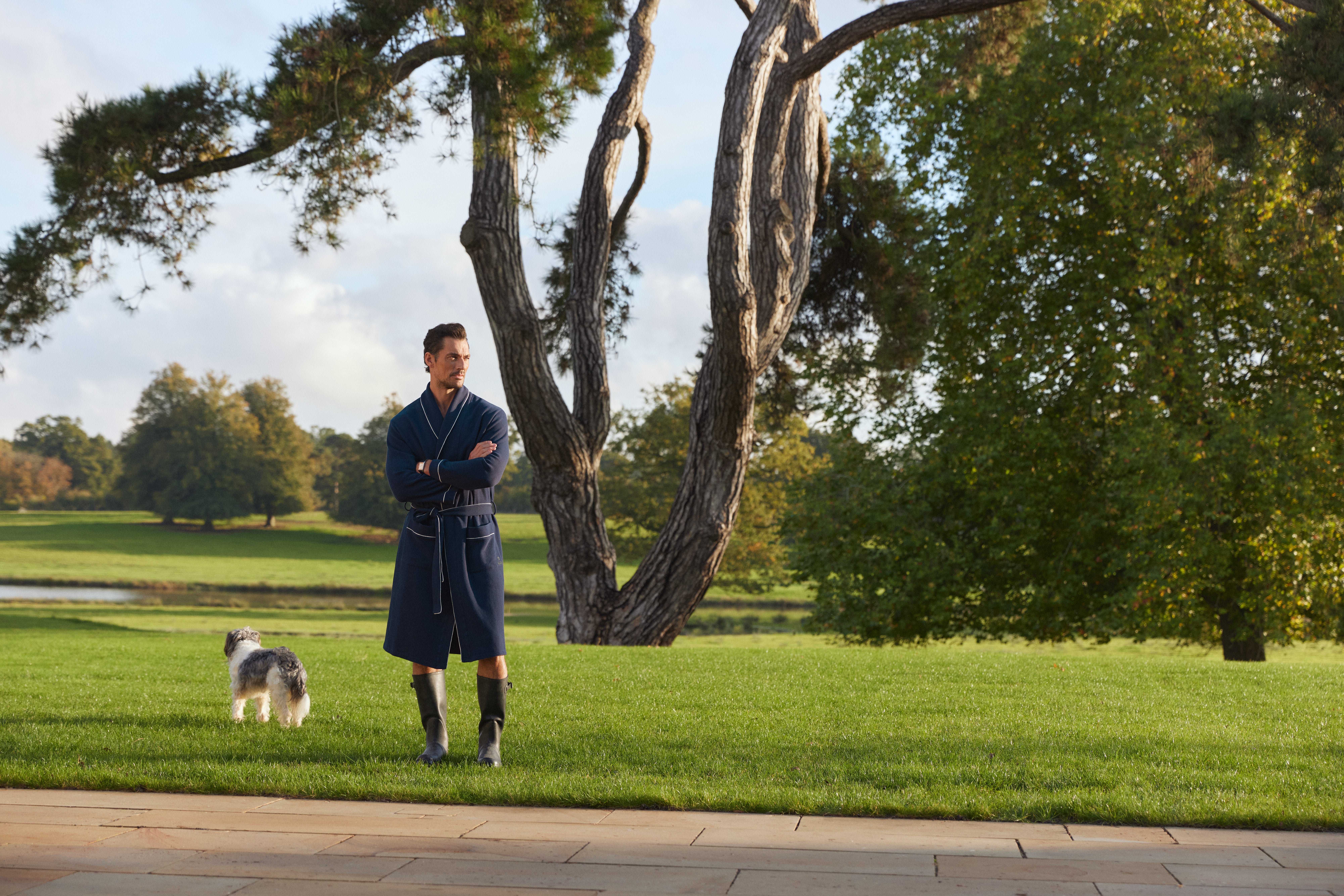David Gandy on modelling, influencers and obesity in the UK: ‘I wasn’t born with this body’
The male supermodel talks to Helen Coffey about body image, how he lost his ‘puppy fat’, his new ‘influencer’ rivals and protecting his daughters from the evils of social media in the age of the internet


I’m picturing David Gandy, arguably the world’s first and only male supermodel, with plaits and bows in his hair. Sitting across from him as he casually sips an English breakfast tea, I thought I’d be picturing him in his famous tiny white trunks – the ones he wore in the Dolce and Gabbana campaign that turned him from a model into a household name back in 2006. But no – it’s ribbons in pretty, pastel shades that will stay with me as the takeaway image.
That’s because he’s just told me that his recently turned five-year-old daughter, Matilda, is currently into hairstyles. And, being the well-trained father he is, he sits patiently in bed while she does her thing. “She’s always saying, ‘Daddy, I’ll style your hair.’ And I need all the help I can get in the morning,” he says wryly.

Gandy’s transition from bronzed sex symbol on the Med to father figure is perhaps unsurprising given he’s now something of an elder statesman in the fashion industry; at the age of 43, he’s been at this game for 22 years. But that doesn’t stop him from turning heads. Dressed down in blue jeans, a black T-shirt and camel jacket he may be, but there’s no disguising his impressive 6ft 2in frame, nor the face so familiar that it’s strange to be talking directly to it. It’s like having a conversation with a walking billboard – albeit one that can speak articulately on issues ranging from disrupting the fashion industry to body image pressures.
Seventeen years on from that Dolce campaign, Gandy still has to fight to change the stereotype of the “dumb” model. He’s creative director of his own clothing brand now – Wellwear – which is the reason he’s sitting down with me today in a Mayfair members’ club to discuss its freshly launched lounge and sleepwear collaboration with quintessentially British label Hackett. But most people continue to know him best for the white trunks (which he’s still got at home, in case you were wondering). Does he feel like he’s been categorised as a “Himbo” – or, in the aftermath of the Barbie movie, a “Just Ken”, “my job is beach”-type airhead?
“Of course, I’ve experienced that,” he agrees. “I definitely had to fight the cliché of being a model. Most people’s only access to that world was Zoolander. People would say, ‘We’re having a meeting with David Gandy,’ and someone else would go, ‘What, the guy in the white swim shorts? Why is he coming on as creative? Why is he coming up with ideas?’
“You have to break those boundaries. You have to prove everything by experience and results.”
If you’re a secure person, you’ll be fine eventually. Don’t worry about these other people; just be headstrong
The trouble is, the Gandy brand is so strong that his face still sells. “I’m trying to get behind rather than in front of the camera. But people keep pushing me in front of it again,” he shrugs. “The traditional sense of what people would say modelling is – I don’t do much of that any more.”
Instead, his life is a constantly shifting mix of being on set as both the creative director and model, recording voiceovers, overseeing the sales and marketing of his clothing line – and, the day after we meet, volunteering to help out on his daughter’s school trip to Battersea. “Everyone tries to pigeonhole what you are,” he says. “I don’t really try and categorise myself as anything. One day I’m a model, the next day I’m a businessman.”
Though he does look back wistfully at the days where he would just have to turn up and look pretty. “I sometimes think, ‘Oh my God, how easy was that?’ Someone dresses you, someone does your hair and make-up, they say what they need – and then you walk away and don’t worry about anything.”
Not so with Wellwear, which is, in his words, “quite intense – which I kind of love”. The latest collaboration with Hackett is the first time he’s fully partnered up with another clothing company, and Gandy had to think hard about which brand would be the right fit. “The word collaboration is used far too much these days,” he argues. “Brands will say, ‘we just want to send you some pieces and you can take some pictures and post them on social media.’ I’m like, that’s not a collaboration.” By contrast, he has a history with Hackett, having done one of his first ever look-books for them 22 years ago; “there’s a longevity, we’ve been working together for a long time,” he says. “They’re about quality.”

You get a sense that here is a man who could be summed up by the term “hands-on”: he apologises for the paint under his fingernails, courtesy of his latest home renovation project in Richmond Park; he tells me about the time he hosted his parents’ anniversary party and ordered 400 plants for the garden, which he was “up until 2am watering like a mad person” himself as there was no one else to do it.
And, as previously mentioned, he’s just as involved when it comes to the role of “dad” to Matilda and two-year-old Tabitha, splitting the school runs with his partner Stephanie, a barrister, and taking them to swimming and horse-riding and all the rest. Has becoming a father to two girls changed how he sees the fashion industry – does he try to shelter his daughters from the body image pressures inherent in seeing “perfect” women advertised from every platform?
“What I’d give my daughters is this advice: if someone is horrible to you and pressuring you or taking the mickey out of your body image – it’s to do with their own insecurities, not yours,” says Gandy. “If you’re a secure person, you’ll be fine eventually. Don’t worry about these other people; just be headstrong.”
On the flip side, he stands firm against the accusations levelled at him that he promotes an “unattainable” body image: “I will always argue that I wasn’t born with this body. When a lot of people are eating dinners and going to bed, I’m at the gym. It takes a lot of hard work. Anyone can do it. Yes, I’ve got a decent frame of 6ft 2in, but anyone can train to have a more muscular body and a fitter body, and I work at that.”
I had puppy fat: it’s not like I don’t know about mickey-taking or having a different body size
It’s a sharp reminder that the David Gandy I see before me, the epitome of the rugged yet suave modern British gentleman, is a creation that was not born but made – carefully crafted over the years to become the powerhouse brand he is today. Growing up in Billericay, Essex, with entrepreneur parents who worked tirelessly (“they were always busy building businesses, and I don’t remember a time when my dad didn’t have to get up to answer the phone during dinner,” says Gandy – though he stresses his family still always made time to eat together), his trajectory to world-famous model wasn’t an obvious one. In fact, he came to the profession comparatively late, and it wasn’t even his idea in the first place – Gandy was studying marketing at the University of Gloucestershire when his flatmate famously entered him into a modelling competition on ITV’s This Morning without his knowledge. He won a contract with Select Model Management at the age of 21 and never looked back.
But if the start of his career seems haphazard, his subsequent moves over the following two decades were extremely calculated and strategic; you don’t become the world’s first male supermodel by accident. In many ways, Gandy is the quintessential self-made brand. And, according to him, a self-made man too – he certainly wasn’t always the Dolce Adonis with the rock-hard abs.

“Everyone thinks that I was like this from about 10 years of age, but I went through different body types and different body sizes. I had what we now call ‘puppy fat’, but at that time we always talked about exercise and eating well. It’s just that your body’s filling out. You go through a couple of years where you have a bit of puppy fat, and you are fat, and then suddenly at 17 I shot up to over 6ft and I was slightly on the skinny side – hence why I started building myself up to be bigger because that’s how I felt better.
“It’s not like I don’t know about the difficulties or mickey-taking or having a different body size.”
Perhaps because of this, he doesn’t really agree when I ponder whether the proliferation of hyper-muscular bodies belonging to “normal” people, rather than those we’d traditionally expect to have them – models, actors, athletes – on social media and reality shows like Love Island puts too much pressure on the modern man.
“We’re the most obese nation in Europe; so maybe not. The narrative is that, yeah, there’s a lot of pressure on guys. Turn that around, and there’s more child obesity than ever. So, is there pressure?

“People should just be healthy. What is ultimately wrong with encouraging exercise and dedication and the gym? We don’t criticise athletes for it. But everything in moderation – and there are people that can be obsessed with it.”
If his daughters wanted to go into the modelling industry, he says he “wouldn’t be against it”, but admits the industry now is a whole different ballgame to when he came onto the scene. “Brands have completely changed the way they shoot and market campaigns because of the impact of social media,” he says. “In the traditional sense, the way a model could be taken off the street, scouted one day and doing a Calvin Klein campaign the next, to become a massive, massive model… I think that’s completely gone. It’s about social numbers. It’s about engagement. It’s about a name.”
In some ways, though, it always was about a name. One name: that’s how you knew you’d made it as a supermodel in the Eighties and Nineties, if people knew who you were without using your surname. Gandy watched and learnt from the top-tier women around him in the industry and followed their lead. “I looked at and spoke to and worked with these supermodels… Cindy Crawford and Naomi Campbell, you don’t even need to say their full name – you say Naomi, Kate, Cindy, Christy, and you know exactly who I’m talking about. It’s a brand. And it was built as a business. And that’s what I did; I just followed their platform.”
People should just be healthy. What is ultimately wrong with encouraging exercise and dedication and the gym?
Because of his background as a “disruptor” – asking why men were paid less in the industry, questioning why they too couldn’t reach supermodel status, pushing through, in his words, “the glass ceiling” of modelling – Gandy won’t be drawn on the new breed of influencer-models, even if they are his main competition these days.
“I’m not going to criticise what influencers do because I like people that disrupt,” he says. “A lot of people jumped on that bandwagon. But there are a lot of people out there that have been very clever and very astute.”
This new pack is a mix of those who’ve grafted to build an online following – essentially plucking themselves from obscurity the way model scouts would have done 20 years ago – and those for whom fame was more birthright than hard-won prize: the Kardashians and Hadids of this world. Though Gandy reserves judgement, there’s clearly a part of him that holds a torch for the old days.
“There is what I call ‘disposable creativity’ now,” he says. “We flick past 50 different creatives on social media, where before we would have waited for a magazine to come out, or to see it up on a billboard…”

On the topic of social media, Gandy does think it’s one of the biggest issues affecting today’s young people – even if he doesn’t quite agree it’s putting undue pressure on them to achieve a perfect body – and it will be quite some time before you’ll see his daughters posting stories or videos to Instagram and TikTok.
“I’m going to try to keep them off for as long as possible,” he says firmly. What age will they be allowed on there? “Twenty-eight is fine!”
More than body image, Gandy believes the pressure to remain eternally youthful is the bigger problem. “It’s the ageing thing,” he says. “People doing anything not to look old.” While he claims to have thus far resisted the urge to go down the Botox route himself – though “never say never” – he thinks men should lean into a skincare routine the same way women have if they want to roll back the years.

Gandy muses that he’d quite like to do his own grooming line for men; then again, he dreams of starting a florist “with a little coffee shop inside. Or I could open a boutique hotel… I get all these silly ideas in my head.”
But it’s not long before conversation turns back to his most important role. “I’m a dad now. My lifestyle before, which I absolutely adored, can be seen as quite selfish – it was just about achieving what I wanted to achieve. That’s changed – my dedication is to my girls. At this age, I want to take all that experience and be able to guide my daughters and take them travelling with me and see it all through their eyes.”
And with that, he’s off to juggle it all once again: more Wellwear meetings, a new “exciting” secret project he can’t disclose just yet and plans for Matilda’s epic-sounding upcoming birthday party back at the house. Compared to all that, I’m not surprised the days of just turning up and donning a pair of white trunks seem like a walk in the park – or a swim in the Med…
David wears the Hackett London x David Gandy Wellwear collection, priced from £50. Available now online at hackettlondon.com and davidgandywellwear.com, and from selected Hackett London stores across the UK and Europe
Join our commenting forum
Join thought-provoking conversations, follow other Independent readers and see their replies
Comments